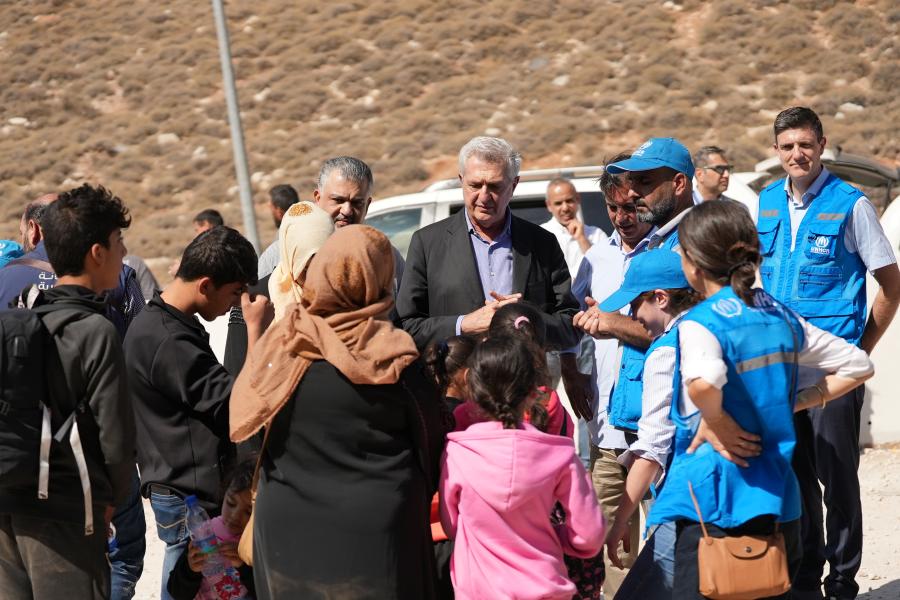We live in an era of relentless emergencies. Of crises without end.
In the last few months, conflict, persecution, and violence have forced millions to flee their homes – in Sudan, Ukraine, and most recently in Lebanon. Millions more have been displaced for years, decades even, having fled bloodshed and instability, from Myanmar to the Democratic Republic of Congo, and many other places in between.
This Global Appeal 2025 describes how, against this backdrop, and with few solutions on the horizon, we expect forced displacement and statelessness to evolve in the coming year, what we plan to do about it, and why your support is more needed than ever.
Needed in emergency contexts, first and foremost, where UNHCR will continue to play its critical, life-saving role. When conflict breaks out, UNHCR is among the first to respond, to be on the frontlines of displacement, bringing relief to people whose lives were turned upside down. But we do not work alone. Reaching those in need – both displaced people and their hosts – requires that we work in partnership, with and through others: governments, local actors, civil society, academia, the UN, donor partners, or the private sector. It requires listening to and being guided by forcibly displaced and stateless people themselves, who are the best advocates for their own cause.
As people continue to flee violence and, increasingly, the effects of climate change and poor governance, forced displacement flows have become more complex. Refugees and migrants move together, often on long, transnational routes, where they face the same risks. Working closely with IOM, UNHCR will continue to support countries of origin, transit and asylum to adopt a route-based approach to responding to mixed flows. This approach encourages governments to address mixed flows comprehensively, by looking for solutions and opportunities – including legal pathways to move from one country to another, regularization programmes, or strengthened asylum systems, to name a few – along entire displacement routes.
Finding solutions will remain a key priority in 2025. Solutions in contexts where people are displaced internally – and UNHCR will be guided by its Strategic Plan for Protection and Solutions for IDPs. Solutions also for asylum-seekers and refugees, whether through efforts to support refugees when they choose to return to their countries of origin, or through opportunities for resettlement and other complementary pathways. And, leveraging the recently-launched Global Alliance to End Statelessness, solutions for stateless people as well.
In all these contexts, even as the work to find solutions continues, UNHCR will further invest in and support innovative approaches. Approaches that build on the vision of the Global Compact on Refugees. Approaches that promote refugee inclusion, resilience and self-reliance.
Traditional responses to forced displacement – which have relied on humanitarian actors, and on humanitarian funding – often place an enormous strain on countries hosting large numbers of refugees, especially in a context where humanitarian funding becomes less reliable the longer a crisis lasts. A more sustainable model lies in promoting the inclusion of displaced people in national and local structures – including, but not limited to, employment, education, health care, access to the internet, or banking. The inclusion of displaced people in national systems benefits both refugees and the communities that host them – but to succeed, it must be supported.
In 2025, and beyond, UNHCR – working with a wide array of partners, and in particular development actors, and our donors – will support efforts and policies that strengthen such sustainable responses – many of which, in Uganda, Colombia, or Kenya, are already well developed.
We often speak of UNHCR playing a catalytic role. Perhaps the greatest recent example of this was the Global Refugee Forum in 2023, which garnered thousands of pledges by States and others with the power to make a difference. A major challenge for 2025 will be to leverage those pledges – turning them from promises into action. This is the responsibility of the pledging entities, of course, but UNHCR will do all it can to remove the obstacles that lie in the path of progress – with technical knowhow, connections with expert partners and development funding, and coalitions of support.
As we look ahead to the next few months, we also know that there will be many as yet unknown crises, emergencies that we cannot foresee. But we are well prepared. Our determination, and our experience, enable us to face the future – as uncertain as it may be – with conviction, and with the confidence that, whatever challenges we might face over the next few months, we will face them together.
Thank you for your support.

– High Commissioner Filippo Grandi
